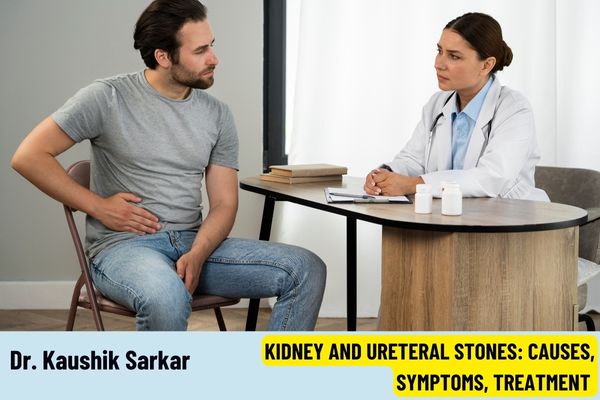Introduction
Kidney and ureteral stones are common, but often painful conditions that affect the urinary tract. These stones, which form in the kidneys and travel into the ureters, can cause extreme discomfort and block the flow of urine. In this blog, Dr. Kaushik Sarkar, a leading specialist in kidney diseases, explains the causes, symptoms, and effective treatment options for kidney and ureteral stones.
What Are Kidney and Ureteral Stones?
Kidney stones are solid, crystalline deposits that form in the kidneys due to various factors, such as dehydration or high mineral concentrations in urine. Ureteral stones occur when kidney stones move into the ureters, which are the tubes that connect the kidneys to the bladder.
Causes of Kidney and Ureteral Stones
Several factors contribute to the formation of kidney and ureteral stones:
- Dehydration: When you don’t drink enough water, urine becomes more concentrated, increasing the likelihood of stone formation.
- Dietary Choices: High levels of salt, calcium, oxalates, and animal proteins in the diet can lead to stone development.
- Obesity: Increased weight can affect metabolism and lead to higher stone formation risk.
- Genetics: A family history of kidney stones can increase your risk.
- Medical Conditions: Conditions like diabetes, hyperparathyroidism, and recurrent urinary tract infections can also contribute to stone formation.
Symptoms of Kidney and Ureteral Stones
Kidney and ureteral stones can cause a range of symptoms, including:
- Severe Pain: Known as renal colic, this sharp, cramping pain usually occurs in the back or side and may radiate to the lower abdomen or groin.
- Hematuria: Blood in the urine, which can turn it pink or red.
- Frequent Urination: The urge to urinate more often, especially if the stone is in the ureter.
- Nausea and Vomiting: Pain from stones may trigger nausea or vomiting.
- Difficulty Passing Urine: A blockage in the urinary tract can make urination painful or difficult.
Treatment Options for Kidney and Ureteral Stones
Treatment for kidney and ureteral stones varies based on the size and location of the stone, as well as the symptoms:
- Conservative Treatment:
- Hydration: Drinking plenty of fluids helps flush out smaller stones.
- Pain Management: Over-the-counter pain relievers like ibuprofen or acetaminophen can help alleviate discomfort.
- Medications: Certain medications may help relax the ureter and ease the passage of the stone.
- Minimally Invasive Procedures:
- Shock Wave Lithotripsy (SWL): A non-invasive procedure that uses shock waves to break down stones into smaller pieces.
- Ureteroscopy: A thin tube is inserted into the ureter to remove or break up stones.
- Surgical Intervention:
- Percutaneous Nephrolithotomy (PCNL): A procedure used to remove large kidney stones through a small incision in the back.
- Open Surgery: In rare cases, surgery may be necessary to remove very large stones.
Prevention of Kidney and Ureteral Stones
Preventing kidney and ureteral stones involves making lifestyle changes:
- Stay Hydrated: Drinking plenty of water helps dilute urine and prevent stone formation.
- Dietary Adjustments: Reduce salt, oxalates, and animal protein intake to lower stone risk.
- Monitor Calcium Intake: While calcium is essential, avoid excessive intake, especially through supplements.
- Medications: For individuals at high risk, medications may be prescribed to prevent stone formation.
Conclusion
Kidney and ureteral stones can be extremely painful but can often be prevented and treated effectively. If you are experiencing symptoms like severe pain or difficulty urinating, it’s important to seek medical attention. Dr. Kaushik Sarkar offers expert advice on the diagnosis and treatment of kidney and ureteral stones, ensuring you receive the best care for your condition.

